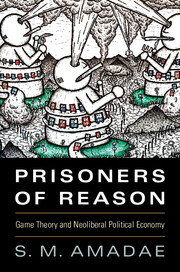2 - Prisoner's Dilemma
from PRELIMINARIES
Published online by Cambridge University Press: 18 December 2015
Summary
Puzzles with the structure of the prisoner's dilemma were devised and discussed by Merrill Flood and Melvin Dresher in 1950, as part of the Rand Corporation's investigations into game theory (which Rand pursued because of possible applications to global nuclear strategy). The title “prisoner's dilemma” and the version with prison sentences as payoffs are due to Albert Tucker, who wanted to make Flood and Dresher's ideas more accessible to an audience of Stanford psychologists. Although Flood and Dresher didn't themselves rush to publicize their ideas in external journal articles, the puzzle attracted widespread attention in a variety of disciplines. Christian Donninger reports that “more than a thousand articles” about it were published in the sixties and seventies. A bibliography (Axelrod and D'Ambrosio) of writings between 1988 and 1994 that pertain to Robert Axelrod's research on the subject lists 209 entries. A Google Scholar search for “prisoner's dilemma” in 2014 returns 106,000 results.
Steven Kuhn, 2014The Prisoner's Dilemma turned out to be one of game theory's great advertisements. The elucidation of this paradox, and the demonstration of how each player brings about a collectively self-defeating outcome, because she is rational in pursuing her own interests, was one of game theory's early achievements which established its reputation among the social scientists.
Shaun Hargreaves Heap and Yanis Varoufakis, 2004As these opening quotes acknowledge, the Prisoner's Dilemma (PD) represents a core puzzle within the formal mathematics of game theory. Its prominence is evident in the steady rise of incidences of the phrase's use from 1960 to 1995, thereafter remaining stable into the present. This famous two-person “game” has a stock narrative cast in terms of two prisoners who each independently must choose whether to remain silent or confess implicating the other. Each advances self-interest at the expense of the other and thereby achieves a mutually suboptimal outcome, miring any social interaction it is applied to into perplexity. The logic of this game proves the inverse of Adam Smith's invisible hand: individuals acting on self-interest will achieve a mutually suboptimal outcome. However, as this chapter illuminates, the assumptions underlying game theory drive this conclusion.
The Prisoner's Dilemma is not only a core problem at the heart of analytic game theory, but it has also been applied to model and explain numerous phenomena throughout politics and economics.
- Type
- Chapter
- Information
- Prisoners of ReasonGame Theory and Neoliberal Political Economy, pp. 24 - 62Publisher: Cambridge University PressPrint publication year: 2016



